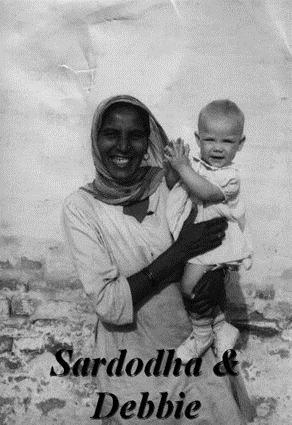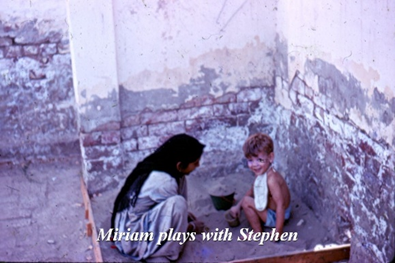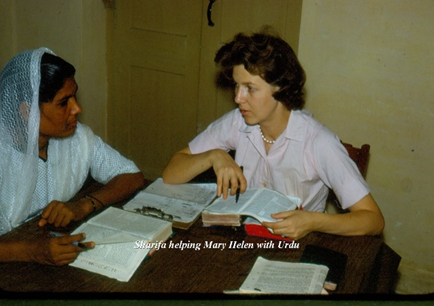Learning a Language with multiple t’s, g’s, and r’s! – Our Story Continued, #9
Settling into the “trembling house,” our first task was to learn the Urdu language. Pakistan has four provinces; Panjab, Frontier, Sindh and Baluchistan. Each of these have their own main languages plus a host of other dialects and tribal languages. Rahim Yar Khan, where we were stationed, is in the very south of the province of the Panjab. Fortunately, Urdu can be understood throughout the country. And so that became our main focus. But that goal challenged us to think far outside what we knew of language with our southern and Canadian accents and experiences. A smattering of French didn’t help. Fortunately, our senior missionaries, the Innigers, were skilled linguists and experienced in how to use the series of textbooks prepared for newbies.
Merle showed us how the script is completely different from that used in western countries whether England or France or Germany. Urdu is written using a Persian script somewhat similar to Arabic. And the writing is from right to left on a page. But the numbers which are diverse from 1,2,3 and read from left to right! Here’s a page from an Urdu hymnbook, #42, “There is a Fountain,” to give you an idea of the language.

We soon learned that the alphabet is also completely different. For example, there are four “t’s”: a soft “t” and a hard “T”. Each of these may be aspirated or unaspirated. That is, they may be expressed with or without a breath of air. There are two “g’s”, one nearer the front of the mouth and the other far back. In this way the “gh” in Afghanistan is pronounced more gutturally that we assume here in the west. There are two “r’s”, one is trilled with the tongue vibrating and one more guttural. The “k” is sounded more like that in Scots or German. We often scratched our heads in puzzlement or laughed uproariously at our attempts to make these sounds.
How, we thought, will we ever master a language so different! How will we find time with constant interruptions to keep body and soul together and care for Stephen and Deborah. Our initial help, the Innigers soon left to fulfill other responsibilities.
But before we proceeded with language study, one problem had to be rectified. We arrived to find single beds! We hadn’t slept separately since our honeymoon. This would not do. Our mission provided basic furniture which included single string beds as was common in the culture. Even for couples. We inquired of the powers that be, to no avail. If we wanted a double-bed we’d have to foot the bill. Did they not believe in marital love?
We hated the idea of breaking mission traditions in our first year, but we had to have a double bed. So with much gesticulation and protestation, the carpenter in the bazaar finally understood our meaning, set to work and a week later delivered our bed. I’m sure we scandalized a few at first, but as the years advanced I think it was a good precedent. Marital harmony includes physical intimacy.

Preparing meals was a time-consuming process. Fortunately, we had a series of Pakistani helpers. When we first arrived, fellow missionaries Anita and Danny loaned us their cook, Emmanuel. He not only cooked, but shopped for groceries. While the local bazaar was fascinating, our ability to communicate was nil. Purchasing meat was beyond our ken. Chicken, goat and lamb were too expensive. Tough old buffalo meat was available, but only Emmanuel knew how to order a cut that was not like shoe leather. Even so it had to be cooked for ages in our pressure cooker unless he found tenderloin. When he did find tenderloin, we had steaks!

Sardodha, Emmanuel’s wife, cared for Stephen and Deborah while we tried to study the language. They became more like part of our family than employees. Their friendship continued throughout our career as did that of Lal and Sharifa Masih who in later years filled the same role. Both families proclaimed their Christian faith. Lal was a deacon in a local church. Many years later, we still have contact with members of these wonderful families.
Not all cooks were helpful. One man we tried to train proved unable to dry dishes without dropping them. He broke all the bone-china cups and saucers we had inherited from Grandma Wright. He blamed the cups! Not, Sorry, I dropped them but, They fell out of my hand, as if the cups were to blame. In the years ahead, we had to let one or two other cooks go due to their penchant for padding the account, the hisab, and pocketing the difference.
We tried to settle into a routine. Give Emmanuel the list of things needed from the bazaar. Make sure the kerosene frig worked. Check that enough water had been boiled and cooled. Be careful about milk. One bought it from a milkwala who came to the door every day. Since these milkwalas were prone to water down the milk, sometimes with canal water, care had to be taken. Some engineering missionary had designed a gadget that could be floated in the milk to evaluate the degree of dilution. Even if undiluted, it had to be boiled until all germs were killed, and cooled without letting it go bad.

With the missionary team depleted, the local church welcomed us with open arms. Although, our attempts to speak Urdu were often hilarious, they would affirm our attempts to say hello, “saw-lamb,” rather than Salaam. One family, the Gills whose father, Yaqub, worked at the Lever Brothers mill in town, was especially helpful. Zareena, a single teacher in that family would come Sunday afternoons and drill us—especially Mary Helen. Sometimes, Sharifa, one of the teachers as the local Christian school would also come to help with our struggles.
 Teacher Sharifa helping Mary Helen with Urdu
Teacher Sharifa helping Mary Helen with UrduIn May of 1964 it came time to travel to Murree in the mountains of Pakistan’s north to enrol in the formal language school. (to be continued)
__ATA.cmd.push(function() { __ATA.initDynamicSlot({ id: 'atatags-26942-629e037cb9b6d', location: 120, formFactor: '001', label: { text: 'Advertisements', }, creative: { reportAd: { text: 'Report this ad', }, privacySettings: { text: 'Privacy', onClick: function() { window.__tcfapi && window.__tcfapi( 'showUi' ); }, } } }); });


